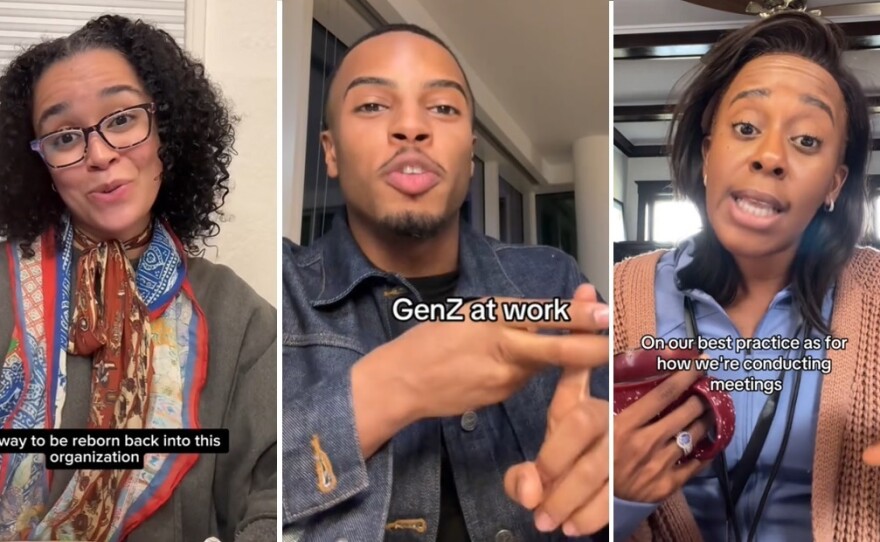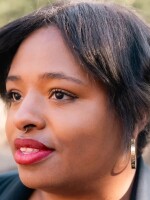"Corporate Erin" appears on your screen, grasping a coffee mug and welcoming everyone on the call back from winter vacation.
"Everyone should have about 15 emails from me if you want to kind of check those and get back to me by EOD," she tells the fictional room. "I kind of just want to check in and make sure that you're kind of on track for everything for Q1, OK?"
Making fun of corporate America is tried-and-true comic terrain, and in recent months it has felt keenly easy to satirize amid mass layoffs in the white-collar world. Now, a slate of comedians on TikTok are putting their own spin on things and laughing through the pain of the sometimes toxic corporate culture.
They've been dubbed "cubicle comedians" by outlets like USA Today, and some of the top creators raking in the views and likes are Black. For Black humor experts, that's no coincidence.
Circling back and hitting deliverables
Lisa Beasley is the creative mind behind Corporate Erin and is arguably the most well-known cubicle comedian on TikTok. Just one of her videos has nearly 11 million views and almost 1 million likes.
What makes Beasley's character so magnetic and funny is that it triggers some traumatic office memories for viewers, all packaged under the guise of short-form humor.
In one video, Corporate Erin tells an employee that losing their entire family to a tragic accident isn't a good enough reason to take more than one day off from work. "Way to bring down the energy of this one-on-one," she tells them.
In another, Erin begins a team morning meeting right before 9 a.m.: "I'm here making sure all the deliverables ... get across to you."
These videos are classic Corporate Erin: absurd, exaggerated and highly relatable.
For Nicole Daniels, another creator behind the "nonprofit boss" character, her role isn't so much as a comedian as it is a conduit for the real-world experiences she's had in the nonprofit space.
"I think that a lot of what I've started creating on TikTok and on Instagram just came out of observing things that I found to be absurd," she told NPR. "And trying to play them as true as possible to what I was witnessing."
Daniels worked in nonprofits before dedicating her time to being an actor and writer. She recognizes that her portrayal of a nonprofit manager can be triggering for people who work in the sector.
"Plenty of followers have said, 'Oh, this happened to me or that happened to me,'" Daniels said. "And I've used some of those examples, but largely they've helped me remember other things that I went through."
DeAndre Brown, a 20-something with years of experience in corporate America, focuses on what it means to be Gen Z in a U.S. office. After getting fed up with overstepped boundaries in the corporate world, Brown turned to TikTok. Soon, he started making videos about his experiences.
"A lot of my content I was creating was based off of real scenarios that were happening at my job, like ... people asking me to work or be on these meetings that were past certain times. And being in meetings that could have been in email and stuff like that," Brown said. "And I utilized social media to say how I would have liked to go about responding to this."
The roots in Black American life
The backdrop of Black humor is why many of these cubicle comedians seem to find an audience as they lampoon American corporate life.
According to Mel Watkins, a Black humor historian and author of On the Real Side: A History of African American Comedy, these creators resonate with so many people because they point out competing realities — something that isn't too far off from what Black comedians have been doing for centuries.
"What they're dealing with ... is the same thing that African American humor dealt with: That is the inconsistency or the absurdity of the arrangement, as presented, that they're dealing with and pointing out those inconsistencies, pointing out the irrationality of that situation," Watkins said.
Irrationalities could look like anything from not being paid for doing twice the work after a co-worker was fired, to answering texts sent late at night from a bothersome boss.
Watkins pointed to the classic skit, "When keeping it real goes wrong" from Dave Chappelle's show that portrays a Black man dropping the corporate niceties and telling his white mentor what he's actually thinking. It's ultimately an example of code-switching, the practice of changing how you say something based on the environment or company you are in.
"[African American humor] started with slavery here. So it was focused on bondage and captivity and the absurdity of that arrangement and went on and expanded when Blacks were freed and had to deal with Jim Crow laws, Black codes and so forth and segregation in the country," Watkins said. "So to a great extent, what defines African American humor is the circumstances of African American life in this country."
Corey Jones co-founded PrismWork, a consultancy focused on workplace diversity and leadership development, and says that "cubicle comedians" resonate with more than just Black folks. He says they strike a chord with anyone who has dealt with the highs, lows and in-betweens of American corporate culture.
"Being able to find these kinds of short, snackable moments within the corporate experience that make you shake your head, weep with tears, or laugh with joy," Jones said. "And the people that are doing it now are masters at identifying those moments that make us all cringe and ultimately laugh at the trauma together."
Copyright 2024 NPR. To see more, visit https://www.npr.org. 9(MDAzMjM2NDYzMDEyMzc1Njk5NjAxNzY3OQ001))







